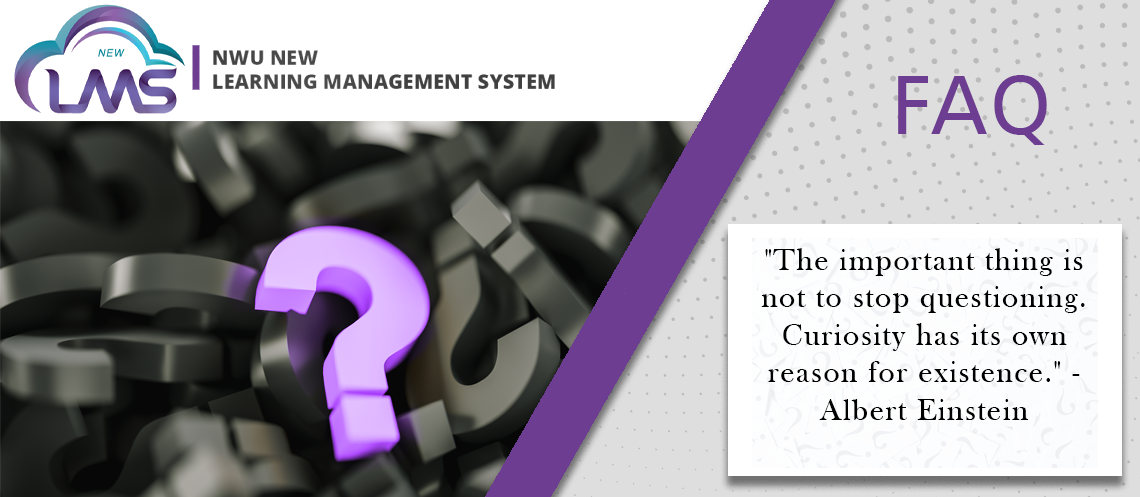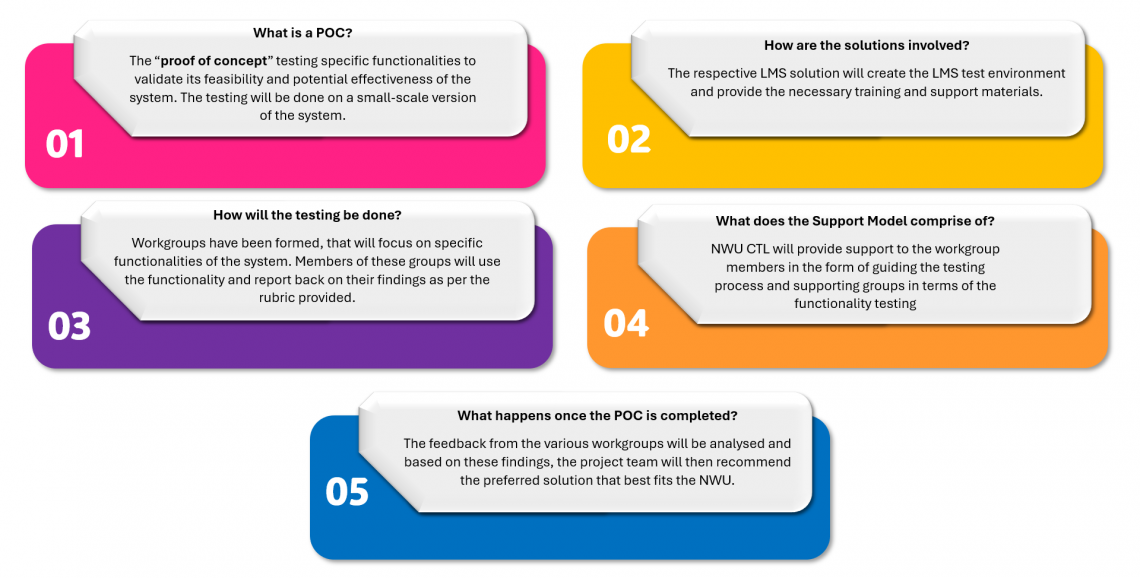
NWU NEW LMS FAQ
1. What are the reasons for replacing the current Learning Management System (LMS), and what benefits are expected from the new system?

During 2022, CTL spearheaded a project to ascertain the level of satisfaction of lecturers and students with the current LMS (eFundi/Sakai). Although most lecturers and students indicated that eFundi is still meeting most of their needs, it was clear from the data that there were many requests for improved functionality. Additionally, to the needs expressed, it has also become evident that the Sakai community, responsible for developing and supporting the community software project, has become very small. This decline in membership OF THE Sakai community therefore poses a risk for the NWU and it was therefore recommended and approved by the NWU IT-committee that an alternative LMS be investigated.
2. Has there been any decision made as to which LMS solution will replace eFundi?

The project team has rigorously narrowed down the selection of potential LMS solutions and is now focusing on finalising evaluation criteria. The choice is currently between two vendors: Blackboard (Anthology) and Brightspace (D2L). please stay tuned for any updates
3. What were the recommendations made to the UMC regarding the NewLMS investigation?

The following were the recommendations made which were approved by the UMC:
- The NWU should embark on an investigation of an alternative LMS that meets the T&L needs of the NWU and integrates with the rest of the University environment.
- As business owner of the LMS, CTL recommends that the investigation into an alternative LMS concentrates on native LMS functionalities related to T&L only. Other requirements, from other support departments as identified in the report, should only be integrated into the LMS where necessary.
- The LMS should focus on teaching, learning and assessment activities, with a view to collecting data to perform learner and learning analytics to:
- inform better design and development of responsive, accessible and supportive learning experiences.
- enable support departments to provide relevant support and inform teaching and assessment approaches.
- provide lecturers with the tools to be responsive in their teaching and learning approach.
- The Business Requirements Definition for an NWU LMS needs to be completed in collaboration with key stakeholders based on the findings from Phase 1.
- Embracing formal project principles, governance and change management as an integral aspect of the roll-out for the following phases of the project.
Project governance will include:- defining accountability and responsibilities
- stakeholder engagement and communication
- meeting and reporting
- risk and issue management
- assurance
- Given the nature of the NWU environment, it is recommended that an independent project manager be appointed to oversee the project.
4. How will lecturers and students be involved in the NewLMS investigation?

It is important to realise that, although CTL will take the lead to manage the project and will contribute (together with IT) to the specifications for a NewLMS for the NWU, the needs and specifications must come from our academic staff and students. You have already been invited to participate during 2022 when CTL conducted surveys and focus group discussions. As the project continues, academic staff and students will frequently be invited to participate in various activities aimed at understanding the needs for a NewLMS system as well as evaluating the shortlisted LMS solutions. Please keep an eye open for any communication and invitations from the core project team via the Daily Comms e-mails. You are also encouraged to frequently visit the NewLMS project webpage where we will update the latest information regularly.
5. Will the New LMS be a self-hosted system or a Cloud-based system?

In response to many requests from academic staff it was recommended that the NewLMS should be a cloud-based system. All four the shortlisted LMS solutions are therefore cloud-based. It is however important to realise that having a cloud-based system will have some implications for the way that we work. Some of the implications are:
- Some technical issues might take longer to resolve as the CTL and IT support teams will not have full access to all aspects of the system.
- Storage capacity per module will be reduced as cloud storage is extremely expensive. No additional storage capacity will be allowed per module.
- Due to the high cost of cloud storage, an annual clean-up process will have to be performed in order to reduce the storage capacity needed.
6. What is the plan for ongoing technical support and maintenance once the new LMS is implemented?

We acknowledge the valuable effort you've invested into eFundi, and request that you please continue working on your sites in eFundi as the project team will follow a phased approach to implementing the NewLMS. We are dedicated to providing you with comprehensive support for a smooth transition to the NewLMS, one that won't impede your ongoing progress. Our aim is to ensure a supportive learning experience for all modules. NWU is dedicated to offering the necessary support and expertise to make this vision a reality.
As the project unfolds, the T&L Technologies help desk, We acknowledge the valuable effort you've invested into eFundi, and request that you please continue working on your sites in eFundi as the project team will follow a phased approach to implementing the NewLMS. We are dedicated to providing you with comprehensive support for a smooth transition to the NewLMS, one that won't impede your ongoing progress. Our aim is to ensure a supportive learning experience for all modules. NWU is dedicated to offering the necessary support and expertise to make this vision a reality.
As the project unfolds, the T&L Technologies help desk, Educational Technologists as well as Instructional designers will all be trained in the use of the NewLMS and will be available to assist lecturers with transitioning to the NewLMS. The precise training and development programme for academic staff and students is still being developed and will be communicated well in advance. Please keep an eye open for any communication on this matter from the core project team via the Daily Comms e-mails. You are also encouraged to frequently visit the NewLMS project webpage where we will update the latest information regularly.
7. How will the transition from the current LMS to the new system be managed, and what support will be provided to faculty during this process?

According to the project timeline the aim is to implement all first-year modules in 2026 – this means that the first-year modules will be facilitated using the NewLMS as of January 2026. The implication is that all lecturers, responsible for first-year modules, will have to be trained and assisted to develop their new environments within the NewLMS during 2025.
During 2026 all remaining lecturers will be assisted to develop their new environments within the NewLMS during 2026 for implementation during 2027. More detail on this phase of the project will be communicated well in advance. As the project unfolds, the T&L Technologies help desk, Educational Technologists as well as Instructional designers will all be trained in the use of the NewLMS and will be available to assist lecturers with transitioning to the NewLMS. Please keep an eye open for any communication on this matter from the core project team via the Daily Comms e-mails. You are also encouraged to frequently visit the NewLMS project webpage where we will update the latest information regularly.
8. How will the new LMS integrate with other existing educational technologies and tools used by faculty and students?

The NewLMS project team will do everything possible to ensure proper integration of the NewLMS with other systems within the NWU technology ecosystem. If you have integrated (even with the assistance of CTL/IT) any third-party software/apps in your current eFundi site, you are encouraged to reach out to the NewLMS project core team to inform them of the software/apps that you have integrated into your eFundi environment. A call for such information will be made by the core NewLMS project team. Please keep an eye open for any communication on this matter from the core project team via the Daily Comms e-mails. You are also encouraged to frequently visit the NewLMS project webpage where we will update the latest information regularly.
9. Can you provide examples or case studies from other educational institutions that have successfully implemented the shortlisted LMS solutions?

The shortlisted LMS solutions are all listed as the four systems with the largest user-base and are in use at various universities in South Africa.
10. When will the transition to the new LMS take place?

Implementation plan under review, please stay tuned.
11. What is a PoC?


